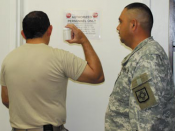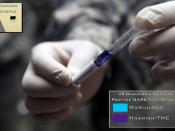Against Drug Testing of Student Athletes
Nothing in the Constitution allows random urinalysis testing for students participating in interscholastic athletics. Such testing of students has not been proven beneficial to the students or the sports programs. More and more schools are testing student athletes for drug use, and so far, they are divided on the question of when and why schools may test student athletes for drugs. Laws vary from state to state, in part because some state constitutions provide more protection than others do for students' privacy rights (ACLU, 2003). The issue of drug testing has caused a national debate that still persists. The debate hinges on the U.S. Fourth Amendment prohibition against unreasonable search and seizure.
The Fourth Amendment to the United States Constitution protects against unreasonable searches and seizures. "The Court set out a three-part test that took into consideration (1) the student's expectation of privacy, (2) the nature of the drug test, and (3) the school's interest or reasons for instituting drug testing" (U.M-KC).
The Indiana Court of Appeals struck down a school policy of performing drug tests on students participating in athletics and other extracurricular activities (ACLU). The court decided to replace the drug-testing policy with a responsible system of parental notification. The board promises to make the schools a more nurturing place and to return a measure of authority over students to parents, with whom it rightly belongs. Now, school officials who suspect a student of drug abuse will contact the student's parents about the concerns, leaving it to the parents to decide if the student should be tested for drugs or treated medically. Other states such as New Jersey, Ohio, Oregon, Texas, and Washington have also decided to use this method (ACLU).
Drug testing gives students an incentive to say "no" not to...


